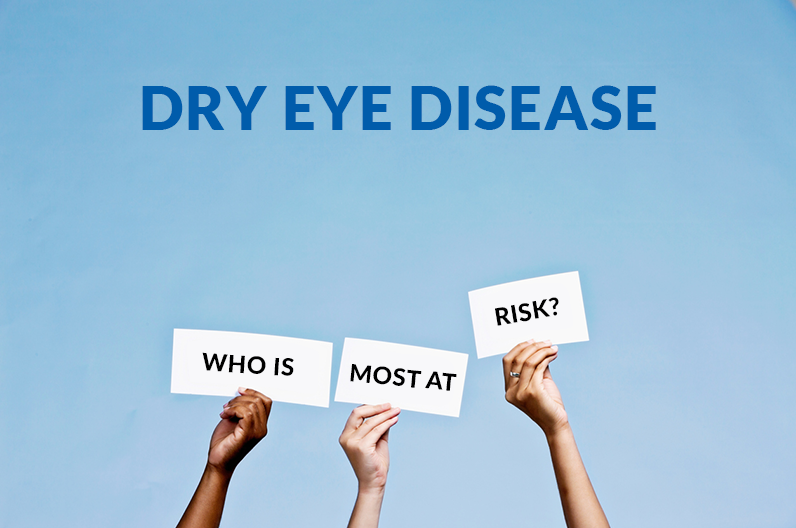(I-MED Pharma)
It is estimated that dry eye disease affects over 340 million people worldwide. Due to its pervasiveness, it has recently been recognized as a global public health problem. [1] Dry eye disease occurs when the tears do not lubricate the eye properly, either due to a lack of tear production, or due to poor quality of tears. This leads to dry, irritated eyes that can cause a significant negative impact on quality of life. Although anyone can be at risk at developing dry eye disease, there are some factors that increase the likelihood.
Risk Factors for Dry Eye Disease:
Gender
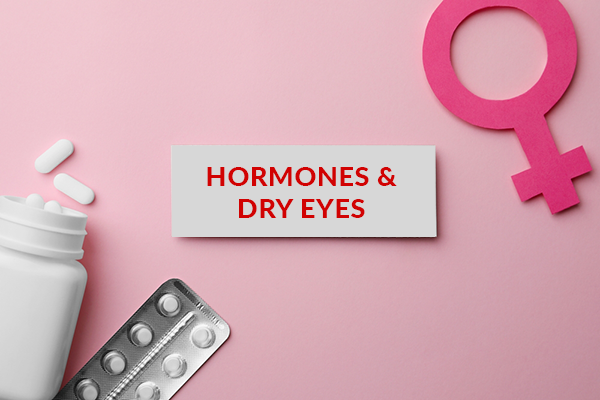
Women are almost twice as likely to develop dry eye disease compared to men. [2] The fluctuation in women’s hormones can affect the level of tear production. Hormonal changes due to birth control, pregnancy, and menopause can all have an impact on the eyes. Furthermore, hormone replacement therapy (HRT) is a post-menopausal treatment that is widely used to help manage menopausal symptoms—a treatment that has been closely linked to developing dry eye disease. [3] Women who use HRT with estrogen alone increase their risk of dry eye by 69 percent, while women who use a combination of estrogen and progesterone are 29 percent more likely to experience dry eye symptoms than women who don’t use HRT at all.[4]
Aging and Dry Eyes
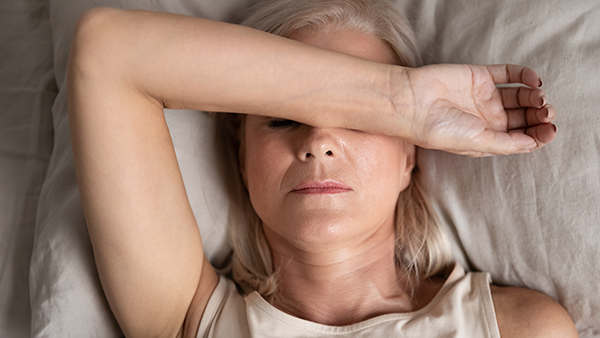
Developing dry eye disease occurs naturally with aging. As we age, the meibomian glands (located in the eyelids) tend to get blocked more easily or can begin to degenerate. [5] Plus, as aging increases, the number of tears produced by the lacrimal gland naturally reduces. This leads to a poor production of water in the aqueous layer within the tear film, which in turn affects the eye’s ability to remain hydrated. [6] Additionally, older adults are particularly susceptible to an inadequate production of tears because at this stage in life, there is a prevalence of autoimmune diseases such as: Sjögren’s syndrome and rheumatoid arthritis, as well as a decrease in corneal sensitivity. [7] Systemic medications including antidepressants, diuretics, dopaminergic drugs for Parkinson’s disease, and antimetabolites frequently used in treating rheumatoid arthritis are all prescription drugs that cause or exacerbate dry eye and are commonly used commonly by older patients. [8]
Screen Time

Dry eye has risen substantially in the past years, in both adults and children alike due to increased levels of screen time. Staring at screens, especially for long periods of time is associated with a decreased blink rate in both adults and children, and the accompanying ocular symptoms from this “repetitive strain disorder” is often referred to as computer vision syndrome. The increased exposure to screens and having a high screen time leads to incomplete blinking and the evaporation of tears, ultimately leading to dry eye disease. [9]
Contact Lenses
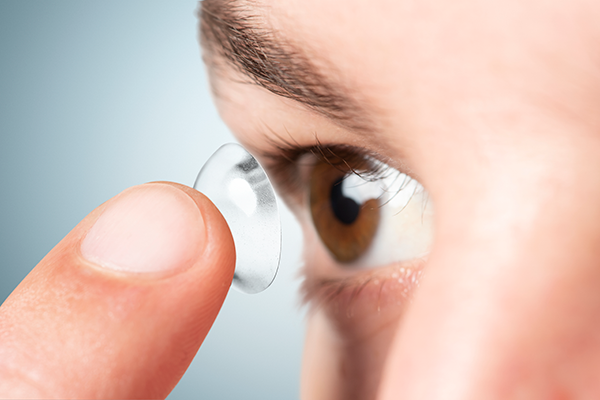
Wearing contact lenses can also cause dry eye. According to a study in Optometry & Vision Science titled “Treatment, Material, Care, and Patient-Factors in Contact Lens-Related Dry Eye”, concluded that about half of contact lens wearers develop contact lens-related dry eye. [10] When a contact lens is inserted onto the eye, the tear film gets separated into two parts, the layer pre- and post-lens tear film. Because the tear film acts as lubrication, the friction between the eyelid and the ocular surface Increases at the site of tear film breakup. [11] This friction between the contact lens and the ocular surface may cause foreign body, dryness, and discomfort sensations to occur. However, symptoms can potentially be alleviated by trying different contact lenses either those made of a softer and more breathable material or simply by changing the size of the lens.
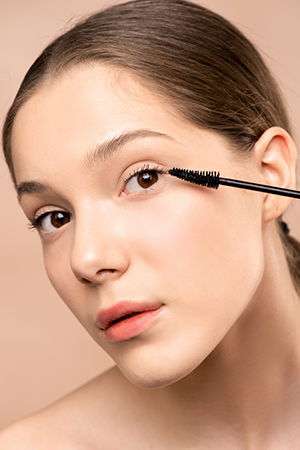
Cosmetics
Makeup can be a culprit in developing dry eye, as makeup can irritate or block glands in the eyelids that secrete oils to help balance the tear film. As the Tear Film and Ocular Society (TFOS) outlines in their recent global workshop titled, “Impact of cosmetics on the ocular surface”, cosmetics can cause a wide range of ocular issues, from the products themselves to the way they are applied. [12] Eye makeup, with the most popular product being mascara, can clog or irritate glands within the eyelids that can contribute to an instability in the tear film. Furthermore, makeup brushes, sponges, or other applicators can serve as a host for a variety of different microbes to enter the eye, which can lead to infection. Improper ocular hygiene and poor removal of makeup can cause makeup on the eye and surrounding the eye to enter and cause irritation. Finally, the ingredients listed in many makeup products can also be an irritant to the eyes, with many makeup products containing harsh chemicals, allergens, and preservatives, that can disrupt and irritate the skin around the eyes which is very delicate.
Medication

Certain medications can have side effects that cause or exacerbate dry eye disease. Medication types include:
- Mood stabilizers (antidepressants)
- Antihistamines
- Decongestants
- Hormone replacements & birth control
- Hypertension medication
- Acne control medication
- Parkinson’s disease medication
- Chemotherapy medications
- Antipsychotic medications [13]
The type of dry eye that occurs will depend on the type of medication and how it interacts with elements of the tear film. For example, antidepressants can block the lacrimal glands which can cause issues in the aqueous layer of the tear film, while decongestants are used to stop mucous production which can then affect the mucin layer of the tear film. The above list is non-exhaustive, and additional medication types may also cause adverse ocular side effects. Certain combinations of medication can also cause issues within the tear film, leading to dry eye disease. It’s important to be aware of side effects prior to taking new medications to be prepared of symptoms that can cause ocular discomfort.
Dry Eye Solutions from I-MED Pharma
I-MED Pharma offers a broad portfolio of dry eye solutions to help manage symptoms of dry eye disease. Solutions offered include:
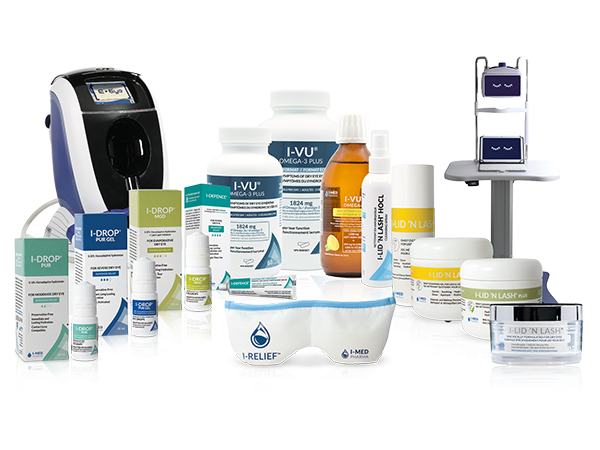
Dry eye disease can affect anyone at any age. It’s important to be aware of certain risk factors that can exacerbate symptoms and be proactive if dry eye is suspected.
Patients can find a clinic near them to learn which clinic offers I-MED Pharma products.
Eye care professionals can book a lunch and learn to have I-MED Pharma representatives come to the clinic and help train the clinic & staff on I-MED Pharma products and dry eye disease.
See the difference today!
[1] I Y Hasan, Z. A. (2022, February 18). Dry Eye Syndrome Risk Factors: A Systemic Review. Saudi journal of ophthalmology: official journal of the Saudi Ophthalmological Society. https://www.ncbi.nlm.nih.gov/pmc/articles/PMC8982940/
[2] Russel, L. (2021a, July 26). Why do dry eyes affect women more than men? Optometrists Network. https://www.optometrists.org/general-practice-optometry/guide-to-eye-conditions/dry-eye/what-is-dry-eye-syndrome/why-do-dry-eyes-affect-women-more-than-men/
[3] Russel, L. (2021a, July 26). Why do dry eyes affect women more than men? Optometrists Network. https://www.optometrists.org/general-practice-optometry/guide-to-eye-conditions/dry-eye/what-is-dry-eye-syndrome/why-do-dry-eyes-affect-women-more-than-men/
[4] Russel, L. (2021a, July 26). Why do dry eyes affect women more than men? Optometrists Network. https://www.optometrists.org/general-practice-optometry/guide-to-eye-conditions/dry-eye/what-is-dry-eye-syndrome/why-do-dry-eyes-affect-women-more-than-men/
[5] Russel, L. (2021a, July 26). Dry eyes and aging. Optometrists Network. https://www.optometrists.org/general-practice-optometry/guide-to-eye-conditions/dry-eye/what-is-dry-eye-syndrome/dry-eyes-and-aging/#:~:text=The%20meibomian%20glands%20in%20the,meibomian%20gland%20dysfunction%20(MGD).
[6] Russel, L. (2021a, July 26). Dry eyes and aging. Optometrists Network. https://www.optometrists.org/general-practice-optometry/guide-to-eye-conditions/dry-eye/what-is-dry-eye-syndrome/dry-eyes-and-aging/#:~:text=The%20meibomian%20glands%20in%20the,meibomian%20gland%20dysfunction%20(MGD)
[7] Sharma, A., & Hindman, H. B. (2014). Aging: A predisposition to Dry Eyes. Journal of ophthalmology. https://www.ncbi.nlm.nih.gov/pmc/articles/PMC4150485/#:~:text=Older%20adults%20are%20particularly%20susceptible,can%2C%20in%20severe%20cases%2C%20have
[8] Sharma, A., & Hindman, H. B. (2014). Aging: A predisposition to Dry Eyes. Journal of ophthalmology. https://www.ncbi.nlm.nih.gov/pmc/articles/PMC4150485/#:~:text=Older%20adults%20are%20particularly%20susceptible,can%2C%20in%20severe%20cases%2C%20have
[9] Akkaya, S., Atakan, T., Acikalin, B., Aksoy, S., & Ozkurt, Y. (2018, August 8). Effects of long-term computer use on eye dryness. Northern clinics of Istanbul. https://www.ncbi.nlm.nih.gov/pmc/articles/PMC6371992/
[10] Watson, S. (2020, March 6). Contact lenses for Dry Eyes. Healthline. https://www.healthline.com/health/great-contact-lenses-dry-eyes#what-is-dry-eye
[11] Kojima, T. (2018, November 1). Contact lens-associated dry eye disease: Recent advances worldwide and in Japan. Investigative Ophthalmology & Visual Science. https://iovs.arvojournals.org/article.aspx?articleid=2717219
[12] David A. Sullivan, Alexandre X. da Costa, Ester Del Duca, Tracy Doll, Christina N. Grupcheva, Sihem Lazreg, Su-Hsun Liu, Selina R. McGee, Rachna Murthy, Purvasha Narang, Alison Ng, Steven Nistico, Leslie O’Dell, Jonathan Roos, Joanne Shen, Maria Markoulli. (2023). TFOS Lifestyle: Impact of cosmetics on the ocular surface. The Ocular Surface. https://doi.org/10.1016/j.jtos.2023.04.005. (https://www.sciencedirect.com/science/article/pii/S1542012423000319)
[13] Nguyen, D., & Goodhew, J. (2020, August 31). 11 medications that can cause Dry Eye. My Dry Eye. https://mydryeye.ca/11-medications-that-can-cause-dry-eye/

